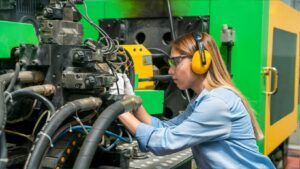Mechanical Engineering Services
Mechanical engineering services encompass a broad spectrum of activities essential for designing, developing, and optimizing mechanical systems and products. These services are fundamental to various industries, contributing significantly to innovation and efficiency. Mechanical engineers play a crucial role in shaping the technological landscape and driving progress across multiple sectors.
Mechanical engineering services involve the application of principles of physics and materials science to create physical systems that serve specific functions.  This field covers a wide range of activities, including design, analysis, testing, and manufacturing of mechanical systems. From conceptualization to implementation, mechanical engineers oversee the entire lifecycle of products, ensuring functionality, reliability, and performance.
This field covers a wide range of activities, including design, analysis, testing, and manufacturing of mechanical systems. From conceptualization to implementation, mechanical engineers oversee the entire lifecycle of products, ensuring functionality, reliability, and performance.
Mechanical engineering services find extensive applications in industries such as automotive, aerospace, manufacturing, and energy. In the automotive sector, mechanical engineers are involved in designing vehicles, improving fuel efficiency, and enhancing safety features. In aerospace, these services are vital for developing aircraft systems, propulsion technologies, and aerodynamics. The manufacturing industry relies on mechanical engineering for process optimization, automation, and quality control. Additionally, in the energy sector, mechanical engineers contribute to the design of renewable energy systems, thermal power plants, and HVAC systems.
The Evolution of Mechanical Engineering Services
Mechanical engineering services have evolved significantly over time, reflecting the continuous advancements in technology and innovation. From historical milestones to recent innovations, the field has witnessed remarkable progress in designing, developing, and optimizing mechanical systems across various industries.
Historical Milestones
- Industrial Revolution:
During the Industrial Revolution in the 18th and 19th centuries, mechanical engineering emerged as a distinct discipline, focusing on the design and development of machinery for manufacturing and production processes. This period marked the beginning of modern mechanical engineering practices. - Invention of CAD Software:
The invention of Computer-Aided Design (CAD) software in the 1960s revolutionized mechanical engineering services by enabling engineers to create detailed 2D and 3D models of products and systems. CAD software enhanced design accuracy, visualization, and collaboration among engineers. - Automation and Robotics:

The integration of automation and robotics into mechanical engineering services has led to increased efficiency and productivity in manufacturing processes. Automation technologies have transformed industries by streamlining production and reducing human intervention in repetitive tasks. - Additive Manufacturing (3D Printing):
One of the most significant recent innovations in mechanical engineering services is the widespread adoption of additive manufacturing, commonly known as 3D printing. This technology allows engineers to create complex geometries and prototypes quickly and cost-effectively, revolutionizing product development and customization. - Smart Manufacturing and IoT:
The convergence of mechanical engineering with smart manufacturing and the Internet of Things (IoT) has enabled the development of connected and intelligent systems. IoT sensors embedded in machinery collect real-time data, optimizing performance, predicting maintenance needs, and enhancing overall efficiency in industrial processes. - Virtual Reality (VR) and Augmented Reality (AR):
Mechanical engineers are increasingly leveraging Virtual Reality (VR) and Augmented Reality (AR) technologies to visualize and simulate product designs in immersive environments. VR and AR facilitate interactive design reviews, training simulations, and prototyping, enhancing collaboration and decision-making in the design process.
Through these historical milestones and recent innovations, mechanical engineering services continue to drive progress, efficiency, and innovation across diverse industries, shaping the future of engineering practices.
Core Areas of Mechanical Engineering Services
In mechanical engineering services, design and analysis play a pivotal role in the development and optimization of products. Design involves creating detailed conceptual drawings and models using specialized software like CAD. Engineers analyze these designs using advanced simulation tools to ensure performance, reliability, and safety.  By iteratively refining and validating designs, mechanical engineers enhance product functionality and efficiency.
By iteratively refining and validating designs, mechanical engineers enhance product functionality and efficiency.
Manufacturing and fabrication are essential components of mechanical engineering services. Engineers oversee the production processes, ensuring that components are manufactured to precise specifications and quality standards. From selecting the right materials to implementing efficient fabrication techniques, mechanical engineers are involved in every step of the manufacturing process. By leveraging cutting-edge technologies like additive manufacturing and automation, they streamline production, reduce costs, and improve overall product quality.

